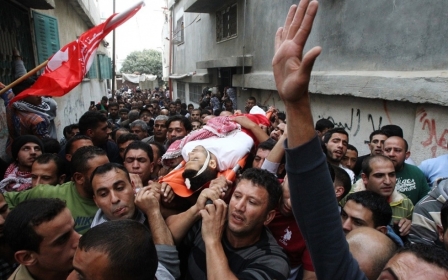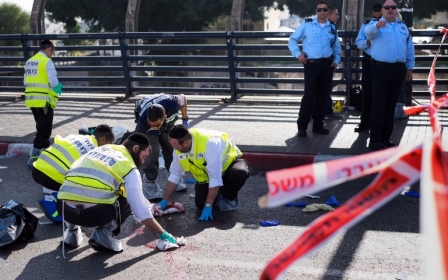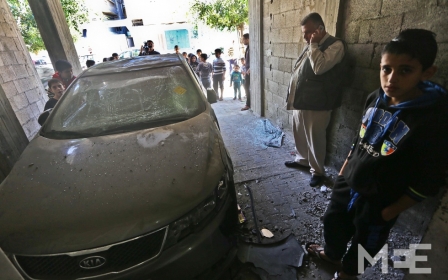Abbas lashes out at Hamas, Netanyahu as tensions soar

Israel Prime Minister Benjamin Netanyahu and Palestinian president Mahmoud Abbas traded blows on Tuesday, blaming one another for a spate of deadly clashes that have intensified near a holy site in Jerusalem. Abbas also lashed out at rival Hamas, accusing the group of carrying out a string of earlier attacks in Gaza
The war of words comes as Palestinians marked 10 years since the mysterious death of their iconic leader Yasser Arafat.
In a speech, Mahmoud Abbas accused Israel of igniting a "religious war" by allowing Jewish worshippers to visit the al-Aqsa compound, Islam’s third holiest site which is also sacred to Jews who believe it to be the site of two ancient temples.
Speaking at a ceremony in the West Bank city of Ramallah, Abbas also accused Hamas of trying “to destroy” the effort to broker a national unity Palestinian government through a series of bomb blasts in Gaza last week.
Hours later Netanyahu hit back, responding to what he said was a "wave of terror attacks" on Israel, saying that Abbas was “not a partner in the effort to curb extremists.”
Abbas, Netanyahu said, was "fanning the flames" and spreading lies, rather than speaking out against terror.
Netanyahu also addressed rising tensions within Israel, which have seen Palestinian citizens of Israel take to the streets and clash with police in the wake of a controversial shooting of 22-year-old Kheir Hamdan an Arab-Israeli in Kufr Kana, near Nazareth over the weekend.
"I call on the Arab citizens of Israel - do not let yourself get dragged into incitement," Netanyahu said. "You are citizens with equal rights and equal duties, and the first duty of every citizen is to respect the law."
We will "reinforce security measures across the country, destroy terrorist houses, implement a stringent policy against stone and Molotov cocktail throwers, and fine the parents of stone throwers," he added. He had earlier announced that all those who are “are shouting against Israel and demonstrating against it […] are welcome to move to the Palestinian Authority or to Gaza…”
Escalations in recent weeks have fuelled speculation that Palestine may be on the verge of a Third Intifada, although Israeli Defence Minister Moshe Yaalon on Tuesday urged for calm.
"We don't see the masses going out onto the streets [in the West Bank]. What we do see in certain places is youths who are participating in popular terror, and principle, we are seeing lone attackers," he told reporters.
"So what do we call it? It's clear there is an escalation, an increase in violence but what shall we call it? Let's wait and see."
Tuesday saw further violence, Israeli security services shoot and kill 22-year-old Palestinian after a group of some 150 Palestinian youths began throwing stones and Molotov cocktails at cars north of Hebron on Route 60, the main north-south road.
Deep rifts
Abbas also used his speech to slam Hamas, laying bare the deep divisions between the two Palestinain factions - Hamas and Fatah - that despite agreeing to form a technocrat unity government in April, remain at loggerheads.
"Who committed this crime? The leadership of the Hamas movement did, and it's responsible!" Abbas roared to applause at a Fatah rally for Arafat in Ramallah, his seat of government in the Israeli-occupied West Bank.
His comments were made in reference to a string of attacks last week, which saw some 10 explosions hit the homes of senior Fatah members in Gaza, reportedly without causing any casualties. Abbas has blamed Hamas for the blasts, which subsequently prompted Hamas to cancel Arafat anniversary commemorations in Gaza.
"Abbas's speech is web of lies, insults and disinformation," said Mushir al-Masri, a Hamas spokesman in Gaza. "What the Palestinian people need is a courageous president."
The deep political rifts between Hamas and Fatah date back to 2007, when the two sides clashes over control of Gaza.
The parties agreed in September that Hamas would relinquish Gaza's land crossings with Israel to the unity government in order to facilitate the entry of reconstruction aid. A devastating 50-day war with Israel in July and August levelled whole neighbourhoods and left tens of thousands of Gazans homeless.
Amid mutual blame, no change of guard occurred and almost no building materials have entered the Strip.
During his address Abbas also discussed the clashes that have gripped annexed East Jerusalem for the past four months, speaking about unrest at the flashpoint al-Aqsa compound, which have been triggered by far-right Jewish fringe groups that demand the right to pray there, in contravention of Israeli law.
Tensions there are seen as fuelling tensions and have been linked to three attacks in East Jerusalem, in which a three-month-old baby, an Israeli police officer and an Israeli teen were all killed when two lone wolf Palestinian attackers ploughed cars into groups of pedestrians. Yehuda Glick a right-wing activist, known for his role in the so-called Temple Mount movement, was also shot and seriously wounded on 29 October. The main suspect in the shooting, 32-year-old Muataz Hijazi - a Palestinian from an East Jeruslaem suburb - was then shot and killed by Israeli police in an early morning raid.
The Palestinians "will defend al-Aqsa and the churches against the settlers and extremists," Abbas pledged.
Abbas also reaffirmed his plans to submit a draft resolution to the UN Security Council later this month, calling for an end to Israel's occupation of the Palestinian territories by November 2016.
He promised that the Palestinians, who won the UN rank of observer state in 2012, would apply to join a host of international organisations if the resolution was blocked by a US veto.
"We will not tolerate any pressure," he said, referring to US efforts to dissuade the Palestinians from approaching the Security Council, labelling this as unhelpful to peace talks - the latest round of which collapsed this April.
New MEE newsletter: Jerusalem Dispatch
Sign up to get the latest insights and analysis on Israel-Palestine, alongside Turkey Unpacked and other MEE newsletters
Middle East Eye delivers independent and unrivalled coverage and analysis of the Middle East, North Africa and beyond. To learn more about republishing this content and the associated fees, please fill out this form. More about MEE can be found here.





